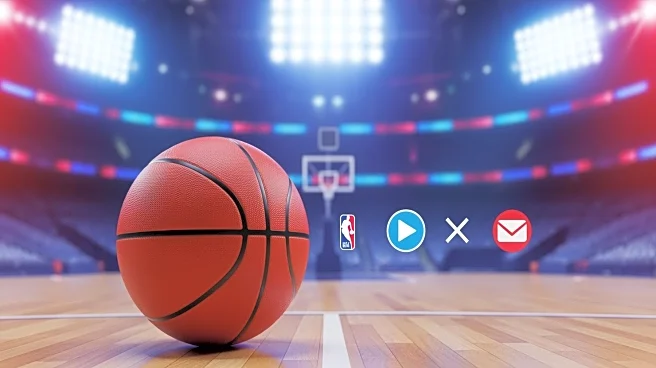What's Happening?
The NBA's 2025-26 season marks a significant shift in broadcasting, with the league returning to NBC after more than two decades and introducing Prime Video as a new streaming partner. This change is part of the NBA's new media rights deal, which aims
to provide fans with more access to games throughout the week. NBC's Peacock and Amazon's Prime Video will join ESPN and ABC in broadcasting games, offering nearly nightly NBA action starting in January. The season kicks off with the defending champions, Oklahoma City Thunder, facing the Houston Rockets, followed by a high-profile matchup between the Los Angeles Lakers and Golden State Warriors. Local market games will continue to be accessible through regional sports networks and streaming services, while national broadcasts will require a combination of networks and platforms.
Why It's Important?
The new media rights deal is poised to reshape how fans consume NBA content, offering more flexibility and options for viewing games. By partnering with NBC and Prime Video, the NBA expands its reach and diversifies its broadcasting platforms, potentially increasing viewership and engagement. This move could benefit fans who prefer streaming services over traditional cable, as it provides more opportunities to watch games live. Additionally, the inclusion of NBC and Prime Video may attract new audiences and enhance the league's global presence. However, the exclusivity of certain games on streaming platforms could pose challenges for fans without strong internet access or those reliant on traditional cable services.
What's Next?
As the season progresses, fans can expect a variety of broadcast options, including exclusive Monday night games on Peacock and Thursday night matchups on Prime Video. NBC's regular-season coverage will feature marquee matchups and special events like the NBA Cup group-stage doubleheader. The league's new media rights deal will also impact the NBA Playoffs and Finals, with NBC and Prime Video playing key roles in broadcasting these events. Fans will need to navigate the new landscape of streaming and cable options to catch all the action, potentially leading to changes in subscription preferences and viewing habits.
Beyond the Headlines
The shift in broadcasting partners may have long-term implications for the NBA's media strategy, influencing future negotiations and partnerships. The league's decision to return to NBC and collaborate with Prime Video reflects a broader trend of sports organizations embracing digital platforms to reach wider audiences. This move could set a precedent for other leagues seeking to expand their media presence and adapt to changing consumer preferences. Additionally, the increased focus on streaming services highlights the growing importance of digital media in the sports industry, potentially driving innovation and competition among broadcasters.
















